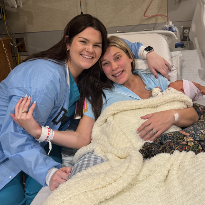One of the things you can do to protect yourself and your unborn baby during pregnancy is to be aware that something may be wrong and act on it. While most pregnancies turn out just fine, complications can occur. And some complications can happen for up to a year after your baby is born.
Below is a list of common warning signs and symptoms of pregnancy related problems, according to the American College of Obstetricians and Gynecologists. It’s also a good idea to make your family aware of these warning signs, so they can help you look out for them as well.
- Headache that won’t go away or gets worse over time
- Dizziness or fainting
- Thoughts about hurting yourself or your baby
- Changes in your vision
- Fever
- Trouble breathing
- Chest pain or fast-beating heart
- Severe belly pain that doesn’t go away
- Severe nausea and throwing up (not like morning sickness)
- Baby’s movements stopping or slowing
- Vaginal bleeding or fluid leaking during pregnancy
- Vaginal bleeding or fluid leaking after pregnancy
- Swelling, redness or pain of your leg
- Extreme swelling of your hands or face
- Overwhelming tiredness
If you have any of these symptoms during or after pregnancy, contact your health care provider and get help right away. This list is not meant to cover everything you might be experiencing. If you feel like something just isn’t right, tell your doctor.
If you are experiencing a medical emergency, call 911 or go to the nearest emergency room. Remember to say that you’re pregnant or have been pregnant within the last year.
Take Action Now
If you believe you are at high risk for pregnancy related complications, talk to your doctor about how to manage your risk factors, including your existing health conditions. If you need to establish a relationship with a prenatal care provider, call (713) 222-CARE or Find a Doctor.
Be honest with your doctor about your medical history. Keep your doctor informed of any new conditions or concerns that arise throughout your pregnancy. And be sure to keep all of your scheduled appointments, both before and after delivery.
Why Choose Memorial Hermann?
Memorial Hermann is dedicated to providing specialized care for patients—both moms and their babies—before, during and after delivery.
The maternal-fetal medicine physicians affiliated with Memorial Hermann offer advanced care for women with high-risk pregnancy conditions and for babies diagnosed with fetal anomalies. Memorial Hermann has the ability to offer patients direct access to high-risk pregnancy clinics close to home, conveniently located across the Greater Houston area.
The Women’s Center at Children’s Memorial Hermann Hospital, part of Memorial Hermann-Texas Medical Center, provides advanced level care for high-risk maternal patients. Children’s Memorial Hermann Hospital has been designated a Level IV Maternal Facility by the Texas Department of State Health Services (DSHS), the highest designation awarded by the DSHS, and has a Level IV neonatal intensive care unit (NICU), the highest level of care available for premature and critically ill newborns, as designated by the DSHS.
Children’s Memorial Hermann Hospital is also home to The Fetal Center at Children’s Memorial Hermann Hospital, a national referral center and international leader in fetal diagnosis, fetal intervention and comprehensive fetal care for infants with congenital anomalies or genetic abnormalities. In collaboration with pediatric subspecialists at McGovern Medical School at UTHealth Houston, the affiliated team offers patients a complete range of prenatal testing and fetal interventions, with a coordinated program for mothers and their babies before, during and after birth.















